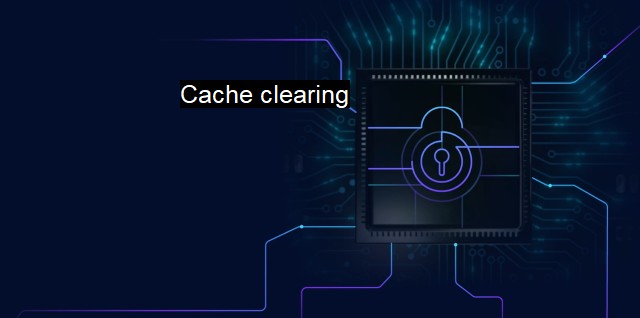What is Cache clearing?
Cybersecurity Measures: The Importance of Clearing Cache to Protect User Data and Privacy Against Malicious Attacks
Cache clearing is a critical operation in the field of cybersecurity and antivirus efforts. Computers and similar devices store information such as images, scripts, and other parts of websites in the form of cache, a form of temporary storage that enables quicker access to data. clearing this cache regularly is as vital for cybersecurity and antivirus protection as it is for efficiency and improved performance.Cache functions by storing data from frequently visited pages, which aids in loading those pages faster. Based on the concept of spatial locality, cache system anticipates that data utilized once will likely be used again. Hence, it buffers this data and uses it to speed up the operation when the system needs the same data again. A certain device or software doesn't need to retrieve the same data from the original location but rather accesses it from the cache, boosting speed.
Cache storage can pose risks for cybersecurity. The stored cache might entail sensitive information like passwords, credentials, or personal information, which put users at a high threat level for cyberattacks if this cache becomes a vector for malware or other malicious entities.
In light of this, cache clearing appears as an important process. It involves the deletion of all temporary stored data in a cache memory. Regularly conducting cache clearing can avoid potential risk exposure, as it eliminates any possible sensitive data that could have been residing in the cache for extended periods.
Insufficient cache clearing opens doors for various cyber risks. For instance, cache poisoning, which refers to manipulating the cache data of a domain name system, makes unsuspecting users visit fraudulent websites. Another risk is cache-based side channel attacks where an attacker can infer the data in the cache based on access timing, thereby obtaining any sensitive information stored in a shared cache.
Continuing on the role of cache clearing in antivirus strategy, it acts as an effective measure in freeing up space that could otherwise be filled with unnecessary files, some of which can be potentially dangerous. These obsolete or redundant files can slow down the system, eventually leading to system inefficiency, annoying lags, and crashes. Even worse, hidden within these files could potentially be malicious programs or viruses. By employing a cache clearing mechanism, obsolete or dangerous files are removed, system performance is improved, it avoids accumulation of useless files over time and consequently contributing to a secure computing environment.
Cache clearing also plays a significant role in accuracy and data integrity. Sometimes, the cached data may no longer be current or relevant, thereby causing inaccuracies or inconsistencies when a user accesses the content. Clearing the cache often resolves these inaccuracies and ensures the users access the most current version of the webpage or software.
While cache serves as an instrument for quicker computing, its around-the-clock presence can threaten cybersecurity. Therefore, cache clearing plays an inevitable role in the broader efforts to protect computers and systems from potential threats. It is also instrumental to antivirus strategies by eliminating potential hazards hiding behind redundant and obsolete files, improving system performance, and ensuring data accuracy and integrity. Hence its forceful potential in strengthening cybersecurity needs unwavering attention.

Cache clearing FAQs
What is cache clearing and why is it important in cybersecurity?
Cache clearing refers to the process of deleting temporary files, browser history, and website data that is stored on a computer or mobile device. This is important in cybersecurity as cached data can potentially be accessed by malicious actors and used for malicious purposes. Clearing the cache regularly helps protect sensitive information and prevent potential cyber threats.How often should I clear my cache in order to maintain good cybersecurity practices?
It is recommended to clear your cache on a regular basis, especially after browsing sensitive websites or after downloading files. Most web browsers have an option to clear the cache manually or automatically. You can also set your browser to clear the cache every time you close the application. In general, it is a good practice to clear your cache at least once a month.Can clearing my cache affect my antivirus software?
Clearing the cache should not affect your antivirus software, as long as you are not deleting any files or programs that are necessary for the antivirus to run properly. However, if you are experiencing any issues with your antivirus after clearing the cache, it may be worth checking the program's settings or contacting customer support.Is cache clearing the same as deleting cookies?
No, cache clearing and deleting cookies are not the same thing. While cache clearing deletes temporary files and website data, deleting cookies specifically targets small files that are stored on your computer by websites to remember your preferences or login information. Deleting cookies can also contribute to good cybersecurity practices, but it does not clear all of the cached data on your device.| | A | | | B | | | C | | | D | | | E | | | F | | | G | | | H | | | I | | | J | | | K | | | L | | | M | |
| | N | | | O | | | P | | | Q | | | R | | | S | | | T | | | U | | | V | | | W | | | X | | | Y | | | Z | |
| | 1 | | | 2 | | | 3 | | | 4 | | | 7 | | | 8 | | |||||||